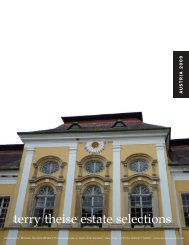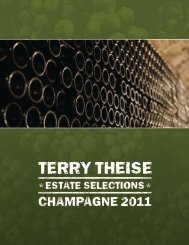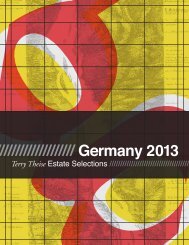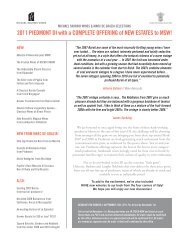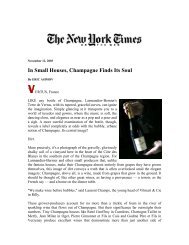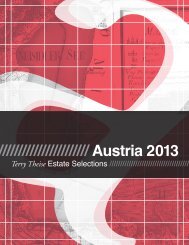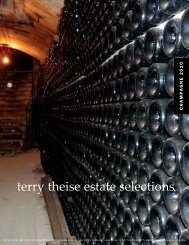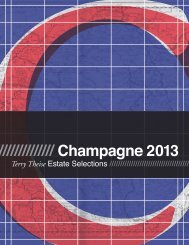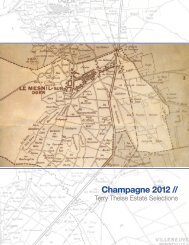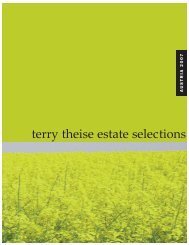German Catalog 2006 USE THIS ONE.qxp - Michael Skurnik Wines
German Catalog 2006 USE THIS ONE.qxp - Michael Skurnik Wines
German Catalog 2006 USE THIS ONE.qxp - Michael Skurnik Wines
You also want an ePaper? Increase the reach of your titles
YUMPU automatically turns print PDFs into web optimized ePapers that Google loves.
80<br />
Does this self-evident truth really need to be<br />
defended any more?<br />
It seems not. I glean a willingness to agree the<br />
phenomenon known as terroir actually exists. Where<br />
opinions appear to diverge are on two related questions:<br />
1) the definition of terroir, and 2) the significance<br />
of terroir beyond its existence as a simple fact.<br />
First, a definition. “Terroir”, as I see it, is the<br />
entire micro-environment in which a vine grows,<br />
beginning with soil, and then beginning with soil’s<br />
components. The structure of soil especially in terms<br />
of porosity is critical, but it doesn’t come first. What<br />
the soil consists of comes first.<br />
Terroir gives wine its DNA. Riesling in northerly<br />
climates is the most vivd demonstration, because<br />
the vine happens to like poor soils, the grape happens<br />
to ripen late, the growers happen to need to plant it<br />
on slopes to maximize the odds of ripeness and therefore<br />
the soils need to be porous and thin or else they’d<br />
wash down the mountain every time it rained.<br />
I suspect the Truth of terroir is universal, but<br />
this is intuition. The phenomenon of Riesling in<br />
<strong>German</strong>y is its most compelling evidence, but not<br />
the only proof. And what exactly is this thing I’m<br />
calling “proof”? It is, very simply, a cause and effect<br />
relationship, repeated dozens-of-thousands of times<br />
in every vintage, between soil components and wine<br />
flavors for which no other explanation is possible.<br />
Even those willing to consider the truth of terroir<br />
might balk at my literal insistence that dirt = flavor.<br />
A famous importer of French wine once said “I<br />
can walk into a vineyard in Pouilly-Fumé and pick<br />
up a fistful of caillou and cram it in my mouth, but I<br />
can’t taste that flavor in the wine.” But this is not<br />
what I argue. I don’t know of any place where you<br />
can literally “taste the soil” (my Mosel growers<br />
might well demur!), but I know of many places<br />
where you can taste what the soil does.<br />
I’ve been challenged that soil’s expression is<br />
determined by the weather, the exposure, the age of<br />
the vines, among many other reasonably cited variables.<br />
And all true, and all irrelevant. Remember my<br />
point that soil-component is a wine’s DNA. It is the<br />
fundamental building block of that wine’s identity.<br />
Elvis is Elvis. Some years it rained and he was thin<br />
Elvis; some years it was hot and he was fat Elvis. He<br />
was sometimes drunk Elvis, sometimes sleepy Elvis,<br />
or cornball, sleazy, charismatic or horny Elvis; in fact<br />
it’s safe to say he was every imaginable variety of<br />
Elvis his temperament could contrive.<br />
But always, he was Elvis.<br />
Nor do I wish to suggest that all of wine’s fla-<br />
A Primer on Terroir<br />
vors derive from soil components. There are of<br />
course macro-factors; an obvious example is the garrigue<br />
flavor imparted to certain wines from grapes<br />
grown near actual garrigue. Yet one hears many<br />
gropings for other explanations for how wines taste,<br />
and many of them are futile. There’s a site called<br />
Kauber Roßstein in the Mittelrhein, which sits just<br />
above a railway tunnel. For years the smoky flavors<br />
of the wines were presumed to derive from actual<br />
smoke, as the trains blew their whistles before entering<br />
the tunnel. Then the lines were electrified - and<br />
the smoky flavor remained.<br />
I’ve also heard it said the notion of terroir has no<br />
practical value unless it constitutes a guarantee. “A<br />
great winemaker will make better wine from “ordinary”<br />
soil than a lazy winemaker makes from<br />
“great” soil”. Again, true, but beside the point.<br />
For years the Plettenberg estate made mediocre<br />
wines from its holding in Schlossböckelheimer<br />
Kupfergrube. This is regarded as one of the top-2-or-<br />
3 sites in the Nahe region. But the wines were rarely<br />
better than ordinary. Meanwhile, Helmut Dönnhoff<br />
made sensational wines from his Oberhäuser<br />
Leistenberg, manifestly the lesser vineyard. Surely<br />
this proved the point that terroir was not the decisive<br />
component of wine quality?<br />
Sorry, it doesn’t. For when Dönnhoff obtained<br />
the old Plettenberg parcel in Kupfergrube (and when<br />
he upgraded the husbandry in what had become a<br />
run-down straggle of vines) it became clear immediately<br />
which was the greater site. All things being<br />
equal, soil will tell.<br />
I know that all things are rarely equal in the<br />
world of wine, but I am not arguing that terroir is<br />
any kind of guarantee for the consumer. I am arguing<br />
that it is the first among many criteria, the basic<br />
reality that one encounters and accounts for before<br />
one truly understands what wine is.<br />
It is certainly impinged upon by the variegations<br />
of weather and of human temperament, but<br />
this signifies very little; some days I’m alert, some<br />
days I’m dozy, sometimes I’m tender and sometimes<br />
I’m gruff, but I am always….fat Elvis.<br />
But can we really be sure of this syllogism?<br />
Because this-or-that is in the soil, such-and-such a<br />
flavor is in the wine? Ah, we want to be sure.<br />
Everything in great wine argues against such<br />
sureties, but we want what we want. It does appear<br />
that Science has taken notice; in the January 2000<br />
issue of Science News, Damaris Chrisensen has some<br />
searching things to say.<br />
“<strong>German</strong> researchers recently studied 165 wines



